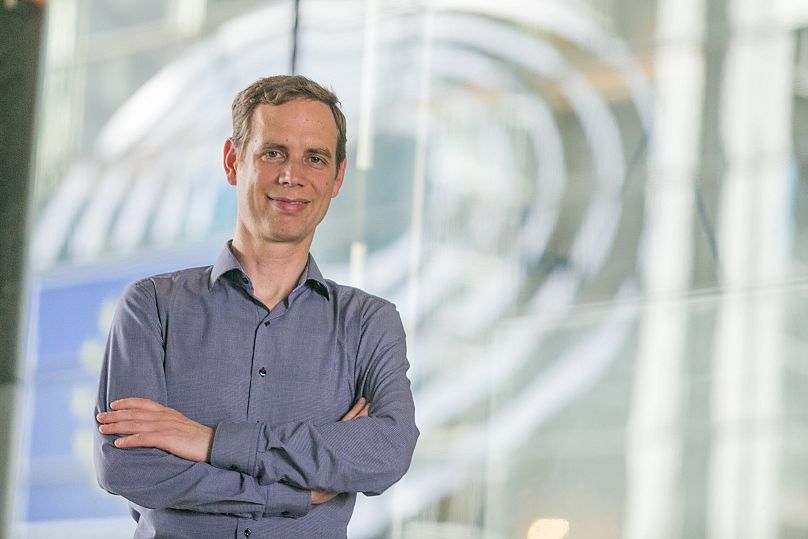Last June, German MEP Patrick Breyer stepped down from his role in the European Parliament, leaving behind a legacy of digital rights advocacy. Euronews sat down with Breyer to discuss his ongoing battle for online privacy, and his perspective on the transformative impact of emerging technologies.
During his mandate, Breyer was a prominent voice against the controversial Child Sexual Abuse Material (CSAM) regulation, also known as “chat control”, and played a key role in the reform of the EU’s e-Privacy regulations—critical to safeguarding online privacy.
 ADVERTISEMENT
ADVERTISEMENT
 ADVERTISEMENT
ADVERTISEMENT
Breyer – who has a track record of challenging both Germany and the EU Commission with lawsuits over data retention - said he will continue fighting for digital rights, in parallel with his work as a civil law judge in his native Germany.
Euronews: For readers who might be unfamiliar, could you explain what the Pirate Party stands for? How would you explain the dip in the number of Pirate Party MEPs, from four to one, between the last mandate and the current one?
Patrick Breyer: The Pirate Party champions fundamental rights in the digital age. The digital revolution has a profound impact on our lives, so it's crucial to shape it in a way that benefits everyone. The Pirate Party was established to promote a human-centric society in this digital era.
The decline in seats in June took us all by surprise, so I conducted a poll among my followers to understand the reasons. The feedback pointed to several factors, including a lack of visibility and the absence of discussions on fundamental rights and technology during the election campaign. Additionally, many felt that other issues, such as countering the far-right or defending the Green New Deal, were more urgent priorities.
Euronews: Are the issues of fundamental rights online being defended by other members of the European Parliament?
Patrick Breyer: Unfortunately, I fear there will be a significant gap in this area. I don't see much interest in digital rights among the current MEPs. For instance, in relation to the "chat control" file I've been shadowing, I'm not aware that other groups have even appointed shadow rapporteurs yet, which indicates a lack of focus on these issues.
Listening to EU Commission President Ursula von der Leyen's recent speech, it was evident that digital rights have taken a backseat. Five years ago, the digital revolution was on par with climate change as a priority for the Commission, but that doesn’t seem to be the case anymore. Similarly, in the European Parliament, there are few digital experts among the incoming MEPs. For example, there's a prominent YouTuber from Cyprus, but while he's skilled in his field, he's not a digital rights expert.
That said, during the last mandate, the major challenges to our digital rights came more from the Commission and national governments than from the European Parliament itself.
Euronews: Speaking of chat control, the Child Sexual Abuse Material regulation is set to be discussed by the Council in October, with the aim of reaching a general approach by December. After the Spanish and Belgian presidencies failed to reach an agreement, do you believe Hungary might succeed during its presidency of the Council of the EU?
Patrick Breyer: There is indeed a risk that a majority could be found for chat control. Last time, the vote was extremely close; had just one more government adopted a different position, they would have achieved a qualified majority. Some governments, like the Netherlands, oppose the regulation due to relatively minor concerns, such as the detection of unknown material, but this still involves breaking encryption and compromising the right to privacy by scanning communications.
Further concessions could potentially lead to a majority, even if the core issues of the proposal—namely, eradicating privacy and secure encryption—remain unaddressed. This is why we must be extremely vigilant. We need to persuade member state governments of the alternative approach proposed by the Parliament, which focuses on using technology to keep children safe by designing apps and services with safety in mind, rather than resorting to surveillance.
Euronews: Can strong security measures coexist with the protection of online privacy?
Patrick Breyer: I believe privacy and security are not mutually exclusive; in fact, privacy is an essential component of true security. We cannot be genuinely secure if our personal data isn’t protected from governments and industries. This is especially crucial as we see the rise of authoritarian-leaning governments, even within the EU. The Pegasus files have shown how many governments have abused surveillance powers for political purposes. It would be naive and extremely dangerous to assume that governments can do no wrong, given what we know today.
With the right approach, it is possible to achieve both privacy and security. However, the dominant discourse in the security industry often prioritises security at all costs, which can easily lead us down a path similar to what we're witnessing in China, where a high-tech surveillance state is being established. This is the great danger, as we have the technology to create such a state, and we must be vigilant to avoid it.
Euronews: E-privacy is still stuck at Council level too. As the negotiator for your political group, what are your expectations for progress on this file?
Patrick Breyer: The file has been stalled primarily due to industry lobbying, with companies like Google opposing measures that would ban tracking walls, which are integral to their business models. When the Council did present its position, it largely ignored privacy concerns, proposing to open up metadata and communications content to business users and government access.
My stance has been clear: if the outcome of the negotiations worsens the current situation and reduces privacy, there’s no point in pursuing the reform. Specifically, the Council’s insistence on legalising data retention, which the Court of Justice has deemed incompatible with the existing e-privacy directive due to its disproportionate nature, has been a major sticking point.
As a result, we might see the Commission withdrawing the proposal.
Euronews: What is the general trend in the EU regarding online regulation? Are we moving towards a safer or more surveilled internet?
Patrick Breyer: The trend appears to be towards both increased surveillance and improved privacy measures. On one hand, the EU is leaning towards greater surveillance. Governments have unprecedented access to personal information due to the pervasive nature of technology, leading to more extensive data collection about our lives.
On the other hand, there is growing awareness and effort from the industry and developers to address privacy concerns. For example, Meta’s decision to make Facebook Messenger chats end-to-end encrypted by default is a significant step forward in protecting privacy.
We have consistently advocated for a moratorium on mass surveillance. It should be a non-negotiable principle for the Commission to avoid proposing new bulk data processing and surveillance measures on citizens.
Stay tuned next week for the fourth episode of Euronews Digital Summer Series - dedicated to the future challenges of AI!


















